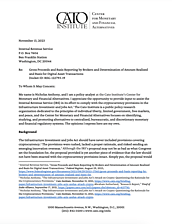To Whom It May Concern:
My name is Nicholas Anthony, and I am a policy analyst at the Cato Institute’s Center for Monetary and Financial Alternatives. I appreciate the opportunity to provide input to assist the Internal Revenue Service (IRS) in its effort to comply with the cryptocurrency provisions in the Infrastructure Investment and Jobs Act. The Cato Institute is a public policy research organization dedicated to the principles of individual liberty, limited government, free markets, and peace, and the Center for Monetary and Financial Alternatives focuses on identifying, studying, and promoting alternatives to centralized, bureaucratic, and discretionary monetary and financial regulatory systems. The opinions I express here are my own.
Background
The Infrastructure Investment and Jobs Act should have never included provisions covering cryptocurrency. The provisions were rushed, lacked a proper rationale, and risked sending an emerging innovation overseas. Although the IRS’s proposal may not be as bad as what Congress set the foundation for, the proposal provided is yet another piece of evidence that the law should not have been enacted with the cryptocurrency provisions intact. Simply put, the proposal would still require a sweeping surveillance program, set a huge burden on small businesses, and put cryptocurrency at an unfair disadvantage to be used as money.
Unjust Surveillance
The language in the IRS’s proposal may be a marginal improvement over the language in the Infrastructure Investment and Jobs Act because it excludes some miners and software developers, but it is still the wrong approach.
The proposal itself acknowledges that it would result in broad, if not sweeping, surveillance. For example, the proposal states that “The Treasury Department and the IRS expect that this clarified proposed definition will ultimately require operators of some platforms generally referred to as decentralized exchanges to collect customer information and report sales information about their customers, if those operators otherwise qualify as brokers.” If the service is decentralized, there should be no third party that is in a position to report this information. So, what’s written here is either a failure to properly define terms or a failure to properly limit the application of the law. In either event, it marks the wrong approach.
The proposal creates further cause for concern when it states that “in recognition of the fact that some digital asset trading platforms … have a policy of not requesting customer information or requesting only limited information [but] have the ability to obtain information about their customers by updating their protocols as they do with other upgrades to their platforms.” Taken to its logical extreme, it’s unclear how this policy would not apply to every American. For example, a grocery store could update its employee training to have cashiers request social security numbers from customers. Likewise, online retailers could update their websites to request similar information at checkout. The present consideration may be slightly limited given that it is coupled with the requirement that someone is also providing services to transfer cryptocurrencies. However, it again marks a wrong approach.

This work is licensed under a Creative Commons Attribution-NonCommercial-ShareAlike 4.0 International License.

